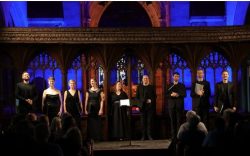 BATH was buzzing on Saturday night – the city’s famous rugby club was winning a big match against Leicester and excited fans were gathering round big screens in bars to celebrate the successes and camp glitz of Eurovision. The atmosphere in the beautiful Abbey was perhaps a little more muted, but the enthusiasm was palpable as Rory McCleery and his eight-strong Marian Consort took to the simple stage at the end of the nave for a concert of music that has lasted 420 years longer than most of the Eurovision numbers will.
BATH was buzzing on Saturday night – the city’s famous rugby club was winning a big match against Leicester and excited fans were gathering round big screens in bars to celebrate the successes and camp glitz of Eurovision. The atmosphere in the beautiful Abbey was perhaps a little more muted, but the enthusiasm was palpable as Rory McCleery and his eight-strong Marian Consort took to the simple stage at the end of the nave for a concert of music that has lasted 420 years longer than most of the Eurovision numbers will.
The programme was a celebration of arguably the greatest English composer of the Renaissance period, William Byrd, and the title of the concert reflected his unique position, as a devout Roman Catholic in Tudor England, where to follow the old faith was to risk the wrath of the Protestant government, clergy and population – and to be a priest serving this recusant community was to risk torture and a horrible death.
All the more reason, then, to wonder at the beauty and joy of Byrd’s music, as well as its deeply spiritual quality – and there was a curiously apposite feel for this 2025 audience, as waves of bigotry, cancel culture, primitive religiosity and persecution sweep through so many countries. Perhaps the recent election of the new Pope has also given even those of us who have no religious connection to reflect on the enduring power and importance of the Catholic Church in the world.
An excellent essay in the informative programme, by the Marian Consort’s founder-director, Rory McCleery, set the historic context as well as providing helpful notes on the works, which included the magnificent Mass for Four Voices, interspersed with motets and settings of psalms – among them the glorious Quomodo cantabimus, Ave verum corpus and a celebratory Salve Regina. There was also a major work, Super flumina Babylonis (By the waters of Babylon) by Byrd’s contemporary Phillipo de Monte, who was employed in the court of the Emperor Maximillian II – and as such safe in the Catholic practice.
The Abbey was full for the concert, the opening classical event of this year’s Bath Music Festival, which began with the poignant and complex motet, Ad Dominum cum tribularer (In my distress I cried unto the Lord, and he heard me), a setting of Psalm 120, which survived uniquely in a private manuscript dated 1578. The striking relevance of Byrd’s early work in our troubled times was emphasised by the final phrases: “I am for peace; but when I speak, they are for war.”
The Abbey’s acoustic underlined the clarity and pure sound of the Marian Consort. The building is perfectly suited to music of this period – the festival audience will also be enjoying the magnificent Stile Antico singing Palestrina in this glorious setting on Wednesday 21st May.
FC
The Marian Consort is back in the south west for the Dunster Festival, which is directed by Rory McCleery and his harpist wife over the late spring Bank Holiday.